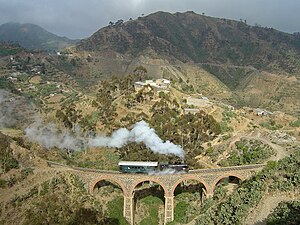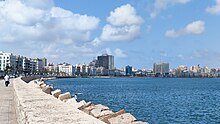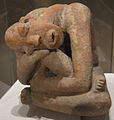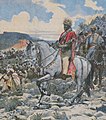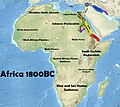
Back Portal:Afrika ALS بوابة:إفريقيا Arabic ܬܪܥܐ:ܐܦܪܝܩܐ ARC Portal:Afrika Azerbaijani Партал:Афрыка BE-X-OLD Портал:Африка Bulgarian دەروازە:ئەفریقا CKB Portál:Afrika Czech Portal:Afrika German Portal:Afrika DIQ



Africa is the world's second largest and second-most populous continent after Asia. At about 30.3 million km2 (11.7 million square miles) including adjacent islands, it covers 20% of Earth's land area and 6% of its total surface area. With 1.4 billion people0 as of 2021, it accounts for about 18% of the world's human population. Africa's population is the youngest amongst all the continents; the median age in 2012 was 19.7, when the worldwide median age was 30.4. Despite a wide range of natural resources, Africa is the least wealthy continent per capita and second-least wealthy by total wealth, ahead of Oceania. Scholars have attributed this to different factors including geography, climate, tribalism, colonialism, the Cold War, neocolonialism, lack of democracy, and corruption. Despite this low concentration of wealth, recent economic expansion and the large and young population make Africa an important economic market in the broader global context.
Africa straddles the equator and the prime meridian. It is the only continent to stretch from the northern temperate to the southern temperate zones. The majority of the continent and its countries are in the Northern Hemisphere, with a substantial portion and a number of countries in the Southern Hemisphere. Most of the continent lies in the tropics, except for a large part of Western Sahara, Algeria, Libya and Egypt, the northern tip of Mauritania, and the entire territories of Morocco, Ceuta, Melilla, and Tunisia which in turn are located above the tropic of Cancer, in the northern temperate zone. In the other extreme of the continent, southern Namibia, southern Botswana, great parts of South Africa, the entire territories of Lesotho and Eswatini and the southern tips of Mozambique and Madagascar are located below the tropic of Capricorn, in the southern temperate zone.
Africa is highly biodiverse; it is the continent with the largest number of megafauna species, as it was least affected by the extinction of the Pleistocene megafauna. However, Africa also is heavily affected by a wide range of environmental issues, including desertification, deforestation, water scarcity and pollution. These entrenched environmental concerns are expected to worsen as climate change impacts Africa. The UN Intergovernmental Panel on Climate Change has identified Africa as the continent most vulnerable to climate change.
The history of Africa is long, complex, and has often been under-appreciated by the global historical community. Africa, particularly Eastern Africa, is widely accepted as the place of origin of humans and the Hominidae clade (great apes). The earliest hominids and their ancestors have been dated to around 7 million years ago, including Sahelanthropus tchadensis, Australopithecus africanus, A. afarensis, Homo erectus, H. habilis and H. ergaster—the earliest Homo sapiens (modern human) remains, found in Ethiopia, South Africa, and Morocco, date to circa 233,000, 259,000, and 300,000 years ago, respectively, and Homo sapiens is believed to have originated in Africa around 350,000–260,000 years ago. Africa is also considered by anthropologists to be the most genetically diverse continent as a result of being the longest inhabited. (Full article...)
Selected article –
Featured pictures –
Did you know (auto-generated) -

- ... that the Phoenixonian Institute was the first African-American high school in California?
- ... that African porters in Salvador, Bahia, went on strike after the provincial government passed a law requiring them to wear metal identification tags?
- ... that Gil Scott-Heron's 1975 song "Johannesburg" was banned in South Africa during apartheid?
- ... that French West African poet David Diop was among 63 people killed when Air France Flight 343 crashed in 1960?
- ... that African American Ivory Winston sang for President Harry S. Truman's birthday and was "Iowa's First Lady of Song"?
- ... that Ivory Coast won the 2015 Africa Cup of Nations Final when their goalkeeper scored a penalty and Ghana's goalkeeper missed?
Categories
Selected biography –

Isaac Folorunso Adewole FAS (born 5 May 1954) is a Nigerian professor of gynaecology and obstetrics. He was minister of health of Nigeria from November 2015 to May 2019 under the Cabinet of President Muhammadu Buhari. He is a former vice-chancellor of the University of Ibadan, and president of the African Organisation for Research and Training in Cancer.
Prior to his appointment as the 11th substantive vice-chancellor of the university, he served as provost at the [[College of Medicine, University of Ibadan]], the largest and oldest medical school in Nigeria. His research interest is in the area of human papillomavirus, HIV, and gynaecologic oncology, a specialised field of medicine that focuses on cancers of the female reproductive system, including ovarian cancer, uterine cancer, vaginal cancer, cervical cancer, and vulvar cancer. Adewole is a member of the governing council of Adeleke University and chairs the National Panel on Cervical Cancer Control Policy.
He is the only Nigerian professor appointed as member of the Council of the Association of Commonwealth Universities. He was appointed to serve as a member of the international advisory board of the African Cancer Institute, a comprehensive cancer centre in sub-Saharan black Africa. (Full article...)Selected country –
 |
 |
||

| |||
Eswatini (/ˌɛswɑːˈtiːni/ ESS-wah-TEE-nee; Swazi: eSwatini [ɛswáˈtʼiːni]), officially the Kingdom of Eswatini (Swazi: Umbuso weSwatini), sometimes written in English as eSwatini, and formerly and still commonly known in English as Swaziland (/ˈswɑːzilænd/ SWAH-zee-land; officially renamed in 2018), is a landlocked country in Southern Africa. It is bordered by Mozambique to its northeast and South Africa to its north, west, and south. At no more than 200 kilometres (120 mi) north to south and 130 kilometres (81 mi) east to west, Eswatini is one of the smallest countries in Africa; despite this, its climate and topography are diverse, ranging from a cool and mountainous highveld to a hot and dry lowveld.
The population is composed primarily of ethnic Swazis. The prevalent language is Swazi (siSwati in native form). The Swazis established their kingdom in the mid-18th century under the leadership of Ngwane III. The country and the Swazi take their names from Mswati II, the 19th-century king under whose rule Swazi territory was expanded and unified; the present boundaries were drawn up in 1881 in the midst of the Scramble for Africa. After the Second Boer War, the kingdom, under the name of Swaziland, was a British protectorate from 1903 until it regained its independence on 6 September 1968. In April 2018, the official name was changed from the Kingdom of Swaziland to the Kingdom of Eswatini, mirroring the name commonly used in Swazi.
Selected city –
Alexandria (/ˌælɪɡˈzændriə, -ˈzɑːn-/ AL-ig-ZA(H)N-dree-ə; Arabic: الإسكندرية; Greek: Ἀλεξάνδρεια, Coptic: Ⲣⲁⲕⲟϯ - Rakoti or ⲁⲗⲉⲝⲁⲛⲇⲣⲓⲁ) is the second largest city in Egypt and the largest city on the Mediterranean coast. It lies at the western edge of the Nile River delta. Founded in c. 331 BC by Alexander the Great, Alexandria grew rapidly and became a major centre of Hellenic civilization, eventually replacing Memphis, in present-day Greater Cairo, as Egypt's capital. Called the "Bride of the Mediterranean" internationally, Alexandria is a popular tourist destination and an important industrial centre due to its natural gas and oil pipelines from Suez.
The city extends about 40 km (25 mi) along the northern coast of Egypt and is the largest city on the Mediterranean, the second-largest in Egypt (after Cairo), the fourth-largest city in the Arab world, the ninth-largest city in Africa, and the ninth-largest urban area in Africa. (Full article...)In the news
- 12 February 2024 –
- Two boats collide on the Congo River near Kinshasa, Democratic Republic of the Congo; with the death toll remains unclear. (AP)
- 11 February 2024 – 2023 Africa Cup of Nations
- In association football, hosts Ivory Coast win their third Africa Cup of Nations by defeating Nigeria 2–1 in the final. Sébastien Haller scores the winning goal in the 81st minute. (The Guardian)
- 10 February 2024 – Somali civil war
- Four Emirati soldiers and a Bahraini military officer are killed, while ten other people are injured, when a soldier opens fire at a military base in Mogadishu, Somalia, before being killed in the ensuing shootout. Al-Shabaab claims responsibility. (AP)
- 10 February 2024 –
- A Eurocopter EC130 helicopter crashes near Nipton, California, United States, killing all the six people on board, including Nigerian banker Herbert Wigwe. (CBS News)
- 10 February 2024 – 2023–2024 Senegalese protests
- Violent protests occur in Senegal following an announcement by President Macky Sall that presidential elections have been delayed from February 25 to December 15. (Sky News)
- 9 February 2024 –
- At least 18 people are killed during a collision between a bus and a truck on a road in Kinshasa, Democratic Republic of the Congo. (AP)
Updated: 16:33, 14 February 2024
General images -
Africa topics
More did you know –

- ... that the British Museum's oldest African-American object is the Akan Drum (pictured) that was used to "dance the slaves"?
- ... that L.C. Lecesne rose to prominence as an activist against slavery after the British Government compensated him for his illegal exile from Jamaica?
- ... that despite receiving a budget allocation in 2003, the public sports stadium in Gibeon, Namibia, hadn't been repaired as of December 2007?
- ... that Thomas Edward Wilkinson was made Bishop of Zululand after his predecessor in South Africa, John Colenso, was excommunicated?
Related portals
Major Religions in Africa
North Africa
West Africa
Central Africa
East Africa
Southern Africa
Associated Wikimedia
The following Wikimedia Foundation sister projects provide more on this subject:
-
Commons
Free media repository -
Wikibooks
Free textbooks and manuals -
Wikidata
Free knowledge base -
Wikinews
Free-content news -
Wikiquote
Collection of quotations -
Wikisource
Free-content library -
Wikispecies
Directory of species -
Wikiversity
Free learning tools -
Wikivoyage
Free travel guide -
Wiktionary
Dictionary and thesaurus
More portals
© MMXXIII Rich X Search. We shall prevail. All rights reserved. Rich X Search

